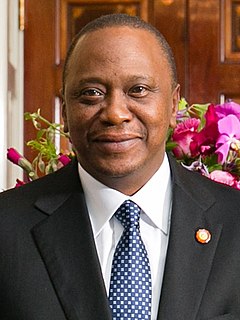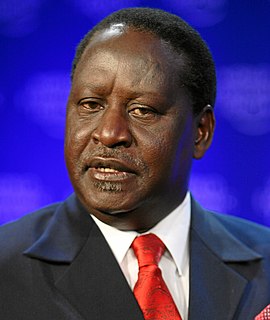
The National Rainbow Coalition (NARC) is a political party in Kenya. As an alliance, it was in power from 2002 and 2005 when it collapsed due to disagreements between members over a constitutional referendum.

William Kipchirchir Samoei Arap Ruto is a Kenyan politician who has been Deputy President of Kenya since 2013. He served as the Acting President of Kenya between 5 and 8 October 2014 while President Uhuru Kenyatta was away at the Hague.He previously served in various ministerial positions including the Ministry of Home Affairs, the Ministry of Agriculture and the Ministry of Higher Education Science and Technology. He was Secretary General of KANU, the former ruling political party, and MP for Eldoret North Constituency between December 1997 and January 2013. He won the seat in the 1997 Kenyan election after defeating Reuben Chesire. He was appointed to the position of Assistant Minister in the Office of the President by President Daniel arap Moi in 1998. He was promoted to be Minister for Home Affairs in August 2002. He also previously served as the Chairman of the Parliamentary Select Committee on Constitutional Reform in the 9th Parliament.

Wycliffe Musalia Mudavadi is a Kenyan politician, who served as the seventh Vice President of Kenya in 2002 and as Deputy Prime Minister from 2008- 2012 May when he resigned officially to join the presidential race. He is the current Party Leader of Amani National Congress (ANC) after decamping from the Orange Democratic Movement (ODM) led by the prime minister Raila Odinga in 2012 where before his resignation he served as the deputy party leader.He was third in the Kenyan general election, 2013.

The Wiper Democratic Movement–Kenya (WDM-K) refers to a political party in Kenya, which originated as a result of the 2005 Kenyan constitutional referendum. It grew out of the Orange Democratic Movement Party of Kenya (ODM). It is headed by Kalonzo Musyoka, who ran for president in 2007 and served as the vice-president in the Grand Coalition of Mwai Kibaki and Raila Odinga. It is now a member of the main opposition NASA.

General elections were held in Kenya on 4 March 2013. Voters elected the President, members of the National Assembly and new Senate, as well as County Governors and Representatives. They were the first elections held under the new constitution, which was approved in a 2010 referendum, and were also the first run by the new Independent Electoral and Boundaries Commission (IEBC).

The Independent Electoral and Boundaries Commission (IEBC) is an independent regulatory agency that was founded in 2011 by the Constitution of Kenya. The Commission is responsible for conducting or supervising referendum and elections to any elective body or office established by the Constitution, and any other elections as prescribed by an Act of Parliament. It was created in a provision of the 2010 constitution and the Independent Electoral and Boundaries Commission Act. Its mandate includes; "the continuous registration of voters and revision of the voter’s roll, the delimitation of constituencies and wards, the regulation of political parties process, the settlement of electoral disputes, the registration of candidates for elections, voter education, the facilitation of the observation, monitoring and evaluation of elections,the regulation of money spent by a candidate or party in respect of any election, the development of a code of conduct for candidates and parties, the monitoring of compliance with legislation on nomination of candidates by parties."
Mohamed Khadhar Ibrahim is a Kenyan lawyer and an Associate justice of the Supreme Court of Kenya.
Smokin Wanjala is a Kenyan lawyer and an Associate justice of the Supreme Court of Kenya. He holds a Ph.D. in law from University of Ghent, Belgium. He also holds a Master of Laws degree from the Columbia University in the United States of America and a Bachelor of Laws (LLB) degree from the University of Nairobi. Wanjala lectured at the University of Nairobi for 15 years, where he taught international law, international human rights law, land law and criminal law.

Miguna Miguna is a Kenyan-born citizen, author, columnist, attorney, and revolutionary intellectual. He is a barrister and solicitor in Canada, and an advocate of the High Court of Kenya. Miguna served as a senior adviser to former Kenyan Prime Minister Raila Odinga from 2009 to 2011.
The inauguration of Uhuru Kenyatta took place 9 April 2013. Kenyatta won 50.07% of the vote in the 2013 presidential election.

The Kenya Presidential Election Petition of 2013 was an election petition aiming to declare the Kenya presidential election 2013 invalid. The Petition was filed at the Supreme Court of Kenya on 16 March 2013.
The Raila Doctrine simply states .....a presidential election, which is not free and fair, should never be acceptable in a democratic country. It was coined if reference to Raila Odinga reacting to his losses in elections in Kenya, which he has termed as fraudulent. The phrase was coined in a legal argument by Senior Counsel Ahmednasir Abdullahi representing the IEBC during the Kenyan Presidential elections petition that was heard by the Supreme Court of Kenya in March 2013. The doctrine simply states .....a presidential election, which is not free and fair, should never be acceptable in a democratic country.

General elections were held in Kenya on 8 August 2017 to elect the President, members of Parliament and devolved governments. The reported results indicated that incumbent President Uhuru Kenyatta was re-elected with 54% of the vote. His main opponent, Raila Odinga, refused to accept the results and contested them in the Supreme Court.

The Jubilee Party of Kenya is the ruling political party that was formed after the merger of 11 political parties, to become one of the major political parties in Kenya. The ceremony announcing the merge was held at the Safaricom Kasarani Stadium on 8th September 2016. The formation of the party was the result of an alliance by the principal members of the Jubilee Alliance party, as well as 10 other political parties. These parties were:
- Jubilee Alliance Party (JAP)
- Alliance Party of Kenya (APK)
- United Republican Party (URP)
- Grand National Union (GNU)
- New FORD–Kenya (NFK)
- FORD People (FP)
- United Democratic Forum (UDF)
- Chama Cha Uzalendo (CCU)
- Republican Congress (RC)
- The National Alliance (TNA)
- The Independence Party (TIP)
Tom R was the main opposition candidate in the 2007 presidential election, running against incumbent Mwai Kibaki. [3] In the subsequent presidential election 5 years later he placed second against Uhuru Kenyatta, garnering 5,340,546 votes, which represented 43.28% of the total votes cast.[4] He made another run for the presidency in August 2017 against Uhuru Kenyatta and lost [5] after the chairman of the electoral body declared Uhuru Kenyatta as the winner with 54% of the votes cast to Raila's 43%.[6] This outcome was eventually annulled by the Supreme Court following findings that the election was marred by "illegalities and irregularities". A subsequent fresh election ordered by the Court was won by Uhuru Kenyatta when Raila declined to participate citing inadequate reforms to enable a fair process in the repeat poll.
Roselyn Kwamboka Akombe is a Kenyan former commissioner of the Independent Electoral and Boundaries Commission (IEBC) of Kenya.















